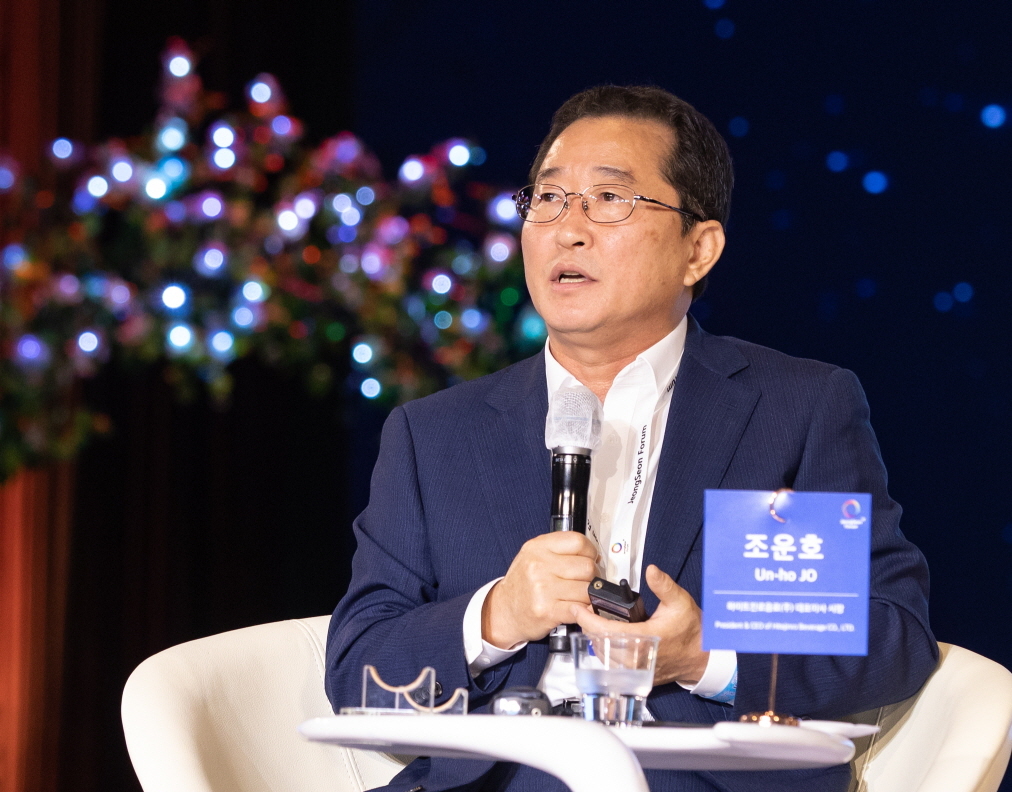[Herald Interview] Beverages legend bets on health drinks, overseas markets
Hitejinro Beverage CEO Jo Un-ho vows to reduce environmental damage
By Park Ga-youngPublished : Sept. 9, 2020 - 17:39
“I’m very excited about this year, which will be the first year our beverage has truly made a foray into the US market,” Jo Un-ho, CEO of Hite Jinro Beverage, said in a recent interview.
Hite Jinro Beverage is a subsidiary of Korea’s leading liquor conglomerate Hite Jinro and produces the group’s nonalcoholic drinks, including purified water and various tea products.
This year, the company extended its market by adding US grocery chain Trader Joe’s as a new sales channel for its Black Barley tea in July, exporting 520,000 bottles.
“Although our products are usually mainly sold to Korean customers in the US or other overseas markets, this time we are specifically targeting US customers,” he added. “It marks the first step toward making my long-standing dream of challenging Coca-Cola with our traditional beverages come true.”
Hite Jinro Beverage is a subsidiary of Korea’s leading liquor conglomerate Hite Jinro and produces the group’s nonalcoholic drinks, including purified water and various tea products.
This year, the company extended its market by adding US grocery chain Trader Joe’s as a new sales channel for its Black Barley tea in July, exporting 520,000 bottles.
“Although our products are usually mainly sold to Korean customers in the US or other overseas markets, this time we are specifically targeting US customers,” he added. “It marks the first step toward making my long-standing dream of challenging Coca-Cola with our traditional beverages come true.”

In 1990, Jo joined Woongjin Group after nine years working as a banker; by 1999, he had become Woongjing Food’s youngest CEO, after surprising the market with a series of hit beverages he introduced when he became marketing director in 1995.
He recalls that the domestic beverage market in the 1990s was a battlefield of global beverage makers. “Back then, the market was filled with foreign juice and brands such as Sunkist and Coca-Cola,” Jo said.
He introduced lyrically and memorably named products that had been developed through careful exploration of Korea’s food and beverage culture, which included Morning Sunshine, a rice beverage that sold 100 million units within the first 10 months, Fall Dates, Green Plum, Sky Barley and the Grateful Nature series.
In 1999, his achievements put him at the head of the Woongjin Food realm by the age of 37, just five years after he joined the company as head of marketing. During his six years as CEO, he revived the company’s prospects, turning it into a cash cow that marked 260 billion won ($219 million) in sales within two years.
Despite leaving the company in 2005, his legacy lives on in the product Sky Barley, which remains the market leader of the barley tea sector almost 16 years after being brought to market. In all that time, he has not changed much, and still draws inspiration from Korean traditional culture, albeit now as the CEO of a different beverage company.
Soon after returning to the industry In 2017, Jo unveiled Black Barley, which became an immediate hit, generating 15 billion won in sales in its first year.
“The future is no caffeine and no sugar, which is why I’m betting on black barley tea to beat not only our domestic competitors, but Coca-Cola.”
Jo, 58, commented that as customers around the world are becoming more health-conscious, the health beverage market is growing fast. By the same logic, the CEO is convinced that soft drinks such as tonic water and nonalcoholic beer will continue to gain popularity.
Within South Korea’s overall beverage market, which is worth 3.8 trillion won, he expects the tea market will grow from 350 billion won to 1 trillion won.
Jo appreciates that disposable plastic bottles have allowed the market to grow incredibly to now be worth some 750 trillion won, but as a CEO of a beverage company, he now believes they have become a growing concern and perhaps even a liability for beverage companies.
“Thanks to plastic bottles, our business was able to grow exponentially but now we have to work to reduce our responsibility for the environment,” Jo said.
According to a report by Greenpeace published on Dec. 31, 2019, South Korea used 4.9 billion disposable plastic bottles, constituting 71,400 tons of waste, in 2017.
“Considering the beverage market began with containers, the negative consequences must be solved from containers,“ Jo said, adding that Hitejinro Beverage has adopted the technology of making plastic weigh less to reduce microplastics.
By making lightweight plastic bottles, the company and the industry can reduce 910 tons of plastics, he said.
“We have by no means reached a holistic solution to this problem, and are committed to continuing our work to produce less pollution,” he said.
By Park Ga-young (gypark@heraldcorp.com)








![[KH Explains] How should Korea adjust its trade defenses against Chinese EVs?](http://res.heraldm.com/phpwas/restmb_idxmake.php?idx=644&simg=/content/image/2024/04/15/20240415050562_0.jpg&u=20240415144419)











![[Today’s K-pop] Stray Kids to return soon: report](http://res.heraldm.com/phpwas/restmb_idxmake.php?idx=642&simg=/content/image/2024/04/16/20240416050713_0.jpg&u=)